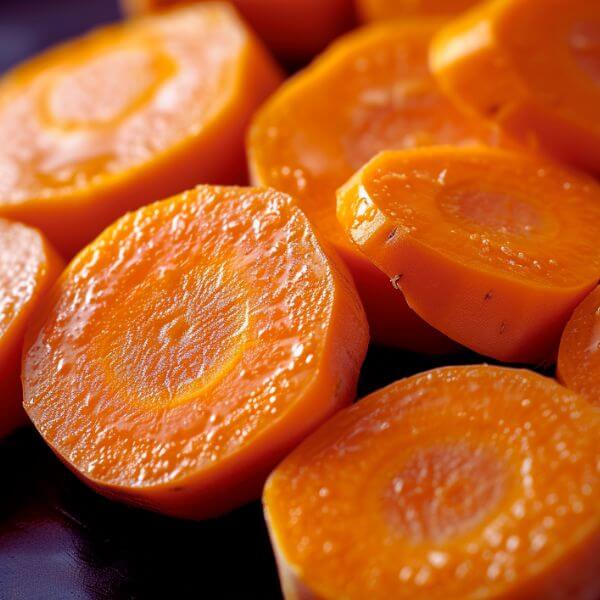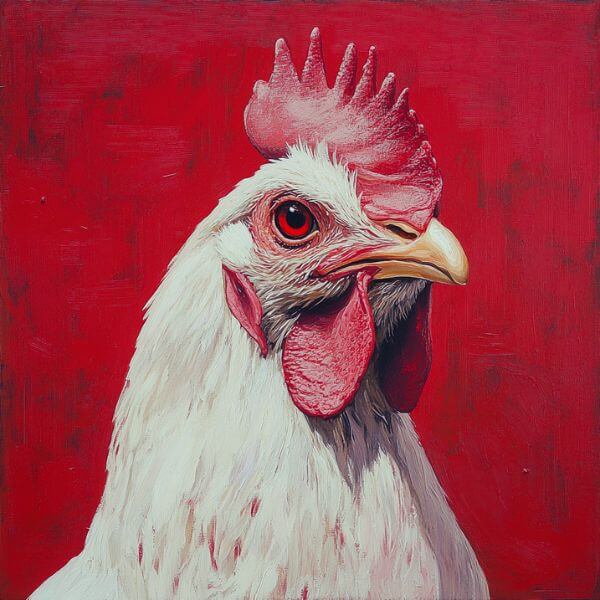Yes, chameleons can eat carrots, but with some important caveats!
Chameleons are primarily insectivores, meaning they mostly munch on bugs.
However, they can digest some plant matter, including carrots.
The nutritional value of carrots for chameleons includes:
| Nutrient | Benefit for chameleons |
| Beta-carotene | Supports eye health and immune function |
| Vitamin A | Essential for growth and vision |
| Fiber | Aids in digestion |
But hold your horses (or should I say, hold your chameleons?)!
Before you start tossing carrot chunks into your pet’s enclosure, there are some risks to consider.
Chameleon diet basics
Before we jump into the carrot conundrum, let’s talk about what chameleons typically eat in the wild:
- Insects (crickets, roaches, flies, worms)
- Leaves and plants
- Occasional fruits
In captivity, we need to mimic this diet as closely as possible to ensure proper chameleon nutrition.
Vegetables play a role in this balanced diet, but not all veggies are created equal in the eyes of a chameleon.
Risks of feeding carrots to chameleons
While carrots aren’t toxic to chameleons, they’re not without their downsides:
- Digestive issues: Chameleons have delicate digestive systems. Too much carrot can lead to upset tummies or even constipation.
- Sugar content: Carrots are relatively high in sugar for a veggie. This can be a problem if fed in large amounts.
- Imbalanced diet: Overfeeding carrots might lead to nutritional imbalances if it replaces other important foods.
How to safely feed carrots to chameleons
If you want to include carrots in your chameleon’s diet, here’s a handy chameleon feeding guide for carrots:
- Preparation: Finely grate or chop the carrot into tiny pieces. Think chameleon-bite-sized!
- Portion size: Offer only a small amount, about the size of your chameleon’s eye.
- Frequency: Treat carrots as an occasional snack, not a dietary staple. Once or twice a month is plenty.
Pro tip: Always wash carrots thoroughly to remove any pesticides or dirt before feeding.
Alternatives to carrots in chameleon diet
Variety is the spice of life, even for chameleons! Here are some other veggies you can try:
- Collard greens
- Mustard greens
- Dandelion leaves
- Squash (in moderation)
Remember, veggies should only make up a small part of your chameleon’s diet. The bulk should still come from insects. Balancing vegetables with insects is key to chameleon nutrition.
Monitoring chameleon health when introducing carrots
Keep a close eye on your scaly friend when introducing any new food, including carrots.
Here are some chameleon health indicators to watch for:
- Regular eating habits
- Consistent bowel movements
- Clear, bright eyes
- Smooth, well-hydrated skin
If you notice any changes in these areas after introducing carrots, it’s best to stop feeding them and consult with a vet who specializes in reptiles.
FAQs about chameleons and carrots
How often can chameleons eat carrots?
As an occasional treat, once or twice a month is sufficient.
Can baby chameleons eat carrots?
It’s best to wait until chameleons are fully grown before introducing carrots or other vegetables.
Should carrots be cooked before feeding to chameleons?
Nope! Raw, finely grated carrots are best. Cooking can reduce nutritional value.
Can chameleons eat carrot tops or just the root?
Stick to the root (the orange part). Carrot tops can be bitter and may not be as well-tolerated.
Are there any chameleon species that should avoid carrots entirely?
While no species are known to be specifically intolerant to carrots, always introduce new foods slowly and observe your pet’s reaction.
Conclusion
So, can chameleons eat carrot? Yes, they can, but in moderation.
Carrots can be a fun and nutritious treat when fed occasionally and prepared properly.
Remember, the key to a happy, healthy chameleon is a varied diet that primarily consists of insects, with vegetables playing a supporting role.
Always keep an eye on your chameleon’s health and behavior when introducing new foods.
When in doubt, consult with a reptile veterinarian. Happy feeding, chameleon lovers!







Leave a Reply